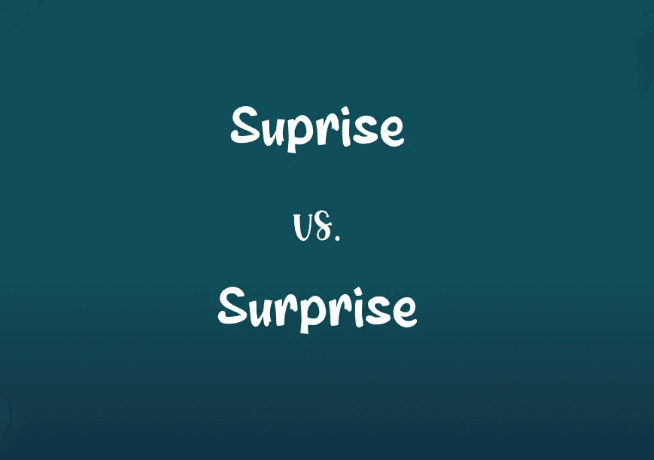Surprise vs Suprise: Unraveling the Confusion in English Spelling
Contents

It was Ravi's big day. After months of toil, he was finally ready to present his project to the board of directors. However, instead of 'surprise', he wrote 'suprise' in his PowerPoint presentation. While he delivered a great presentation, many on the board noticed the spelling error and it became a topic of discussion, weakening Ravi’s otherwise brilliant work.
Does that sound familiar? Such minor slip-ups are common amongst non-native English speakers and can impact both personal and professional communication.
In this blog post, we aim to steer you clear of such traps. We will look into the correct pronunciation and usage of ‘surprise’, provide tips for remembering how to use the word correctly, and include practice exercises that will help solidify what you have learned. Let's start.
What's in a Word? Understanding Surprise vs Suprise
When it comes to English language learning, understanding the correct spellings of words is important.
Let's look at one such example - "surprise". A commonly used word, "surprise" is a noun and a verb and it refers to an unexpected or astonishing event, fact, or thing. For instance, you might say, "The sudden rainfall was a pleasant surprise," or "She surprised him with a birthday party."
On the other hand, 'suprise' does not exist in English. It’s simply a common misspelling made by learners and even native speakers. It largely happens due to the pronunciation of 'surprise', where the first 'r' often sounds weak or gets omitted entirely in casual conversation.
Can You Spot the Error? Common Mistakes Made
Even for fluent English speakers, spelling errors can sometimes slip into our written communications.
Consider these two sentences:
"I planned a birthday suprise for my sister."
"The exam results were a complete suprise to him."
In both instances, the word 'suprise' is incorrect. The correct spelling is 'surprise'. The confusion often arises because while speaking, we tend to pronounce it as if it had one 'r', leading many learners to misspell it in their writing.
So the corrected sentences would look like this:
"I planned a birthday surprise for my sister."
"The exam results were a complete surprise to him."
Pronunciation Matters! How to Say it Right'

The word we're looking at is 'surprise', pronounced as /səˈpraɪz/. The first syllable is quite soft, almost like a whisper: 'su'. The stress falls on the second syllable 'prize', pronounced with a clear, long 'i' sound.
Often, mispronunciations lead to spelling errors and thus, we find people writing 'suprise' instead of 'surprise'.
Handy Tips to Avoid Confusion
Here are three tips to help you distinguish between 'surprise' and 'suprise':
Remember the Correct Spelling: The correct spelling is 'surprise' - with two R's. Use memory cues to remember this. For instance, associate 'surprise' with the phrase 'Really Remarkable', both having double Rs.
Use Spell Check Tools: Use spell check tools available in most writing software like MS Word, Google Docs or Grammarly. These tools automatically correct or highlight misspelt words like 'suprise'.
Try this simple exercise at home: write down 10 sentences using the word 'surprise'. This practice will strengthen your understanding of its correct usage and spelling.
Clapingo’s Aid: Overcome Common English Language Barriers
Overcoming common English language mistakes, like the misuse of “surprise” and “suprise”, can be a difficult task. But don't worry! With Clapingo's personalised coaching sessions, you can conquer these hurdles easily. Our native English-speaking coaches provide one-on-one sessions in your native language. They make it easier for you to understand and correct your mistakes. One of the primary areas we focus on is pronunciation.
Clapingo can help you learn new words and phrases relevant to different professional and personal scenarios, which can greatly improve your communication skills. In fact, with regular practice and our expert guidance, soon enough "surprise" versus "suprise" will no longer be a challenge in your English fluency journey!
To Sum Up
We've learned that 'suprise' is a common misspelling of the word 'surprise'. Practising regularly and exposing yourself to different contexts where the word ‘surprise’ is used can help you master its spelling and pronunciation.
If you're looking for more personalised guidance to better your language skills, consider Clapingo. Made specifically for Indian learners, Clapingo offers flexible one-on-one coaching sessions in English for your unique learning needs. Our coaches are native English speakers who understand the nuances of the language that textbooks often miss.
So keep practising and never hesitate to ask for help when needed.
Frequently Asked Questions
1. What’s the difference between ‘surprise’ and ‘suprise’ in English?
'Surprise' is the correct spelling in English, meaning an unexpected event or piece of information. 'Surprise' can be a noun, as in, "The party was a great surprise," or a verb, as in, "He surprised me with his knowledge." 'Suprise', on the other hand, is simply an incorrect spelling.
2. Is it common for non-native English speakers to misspell ‘surprise’ as ‘suprise’?
Yes, it's fairly common for non-native English speakers and to misspell 'surprise'. This usually happens because of phonetic confusion—people often spell words how they sound.
3. How can I avoid such spelling mistakes in future?
One way to avoid this particular mistake is by remembering that 'surprise' has two 'r's—one before and one after the 'p'. Practising regularly and reviewing your work are also effective strategies. Clapingo's personalised coaching sessions can help you strengthen your vocabulary and spelling skills.
Comments
Your comment has been submitted